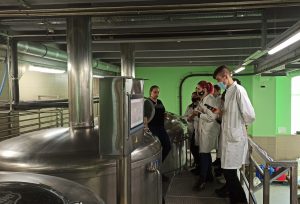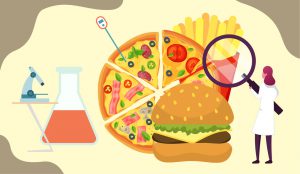👨🎓 A Food Technology Specialist – is a specialist who oversees food throughout its life cycle, from raw materials, through production technology to packaging and storage. Such a specialist can develop and implement effective technologies at different stages of food development. Quality food is the key to a nation’s health. The task of the food industry is the most complete processing of agricultural products. This is possible only through the introduction of modern efficient technologies, which are developed by food production technologists.

👨🎓 WHAT CAN A GRADUATE OF THE DEPARTMENT OF FAT TECHNOLOGY AND FERMENTATION PRODUCTS DO?
- Technologist-developer of new products
- Technologist of food production
- Specialist of the laboratory of diagnostic research
- Specialist in the implementation and maintenance of food products
- Specialist in the implementation and maintenance of food quality control systems (HACCP, ISO, FSSC)
- Specialists of laboratories of quality control of raw materials and finished products
- Food certification specialist
- Food sales specialist
- Specialist-microbiologist of food control
- Food safety control specialist (food additives, contaminants, natural toxins)
- Human nutritionist
- Researcher
- Lecturer in higher education institutions
- Graphic documentation specialist
- Food screening in terms of quality, safety
- Food screening in terms of quality, safety

👨🎓 MAIN DIRECTIONS OF TRAINING OF SPECIALISTS IN FOOD TECHNOLOGY
Direction – research of product quality and safety
The modern state of development of the food industry involves considering product quality not only in terms of compliance of final products with all standards, but also, most importantly, involves control of all stages of production from growing raw materials in the fields, through management of the entire food business to sales.
Therefore, food quality management is a complex, multifactorial process, without understanding which work in any position of a food company is impossible.

This direction forms the following:
- ability to conduct various studies to establish the quality of food;
- mastery of techniques and approaches to laboratory analysis;
- ability to search and use the necessary regulations;
- understanding of metrological requirements;
- ability to perform managerial functions;
- ability to work with quality systems.
Direction – design of enterprises
Enterprise design is the pinnacle of engineering, creating technologies of the present and the future.
This area of study forms the following:
- Knowledge of the state of the industry and prospects for its development
- Ability to read technological schemes
- Ability to use AutoCAD, Compass, etc.
- Ability to create graphic documentation
- Ability to create projects of plants, technological lines, etc. (including taking into account the “environmental friendliness of production”)
- Knowledge of the layout of equipment, the ability to competently place equipment in production facilities
- Ability to compile technological documentation
- Ability to solve technological issues
- Ability to perform management functions
- Ability to manage technological processes

This direction is included in the general scheme of training to achieve the following goal of training:
- Accumulate all scientific achievements of the modern state of the art;
- Practically use new technologies;
- Realize the ultimate goal of any ideas, technologies, etc. – their practical application.
Direction – industry technology, study of advanced technologies
Conditions for the development of a market economy require a specialist with a high level of information awareness
The direction forms the following:
- knowledge of the state of the industry and prospects for its development;
- knowledge of modern technologies;
- ability to change the technological process in order to increase its efficiency;
- ownership of skills to solve quantitative and qualitative problems of enterprise development;
- ability to implement the latest advances in science and technology.

Direction – research
- Development of new technologies and improvement of existing ones;
- Search for promising areas of food technology development;
- Development of waste-free technologies;
- Development of new products

